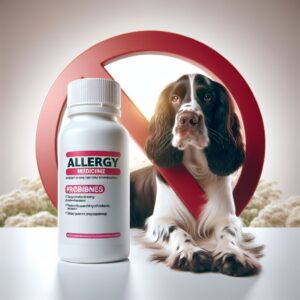
Table of Contents
Key Takeaways
Identify common allergy medications that can be toxic to dogs.
Recognize the symptoms of pet poisoning to act quickly.
Use secure storage solutions to prevent accidental ingestion.
Know when it is safe to share medications with your pets.
Learn safe methods for disposing of unused or expired medications.
Spring’s Secret Hazards for Your Hunting Buddy
As the snow gives way to budding trees, our dogs are just as excited as we are to get outside and enjoy the fresh air. But the arrival of spring also means we’re reaching for over-the-counter and prescription medications more often to combat our seasonal allergies. And it’s important to remember that what’s safe for us may not be safe for our furry friends.
Allergy Medications that are Harmful to Dogs
Many allergy medications include ingredients that are harmful to dogs. For instance, antihistamines that include decongestants like pseudoephedrine are especially harmful. Even a small amount consumed by your dog can cause severe health problems, such as:
Increased heart rate
Elevated blood pressure
Seizures
Consequently, it’s crucial to store these drugs safely and to talk to your vet before starting any allergy therapy for your pet.
Common Human Medications Can Be Dangerous for Dogs
Most pet owners know not to feed their dogs chocolate, but many don’t realize that common human medications can be just as dangerous. Pain relievers like ibuprofen and acetaminophen can cause liver and kidney damage, while certain antidepressants can lead to neurological issues. And it’s not just prescription medications that can be harmful; over-the-counter drugs can also pose a threat to your pet.
Common Household Medications That Can Trigger Seizures in Dogs
There are certain medications that we keep at home for human use that can cause seizures in dogs. These include:
Naproxen – typically found in Aleve
Ibuprofen – also known as Advil or Motrin
Diphenhydramine – especially when mixed with other substances
Always make sure to store these items safely, out of reach of our pets’ curious noses and paws and always be aware if you drop a pill how critical it is to find it and dispose of it safely.
Identifying the Symptoms of Pet Poisoning
Being able to identify the symptoms of pet poisoning can be a lifesaver for your dog. Symptoms can range greatly but often include:
Throwing up or loose stool
Tiredness or hyperactivity
Unusual behavior or restlessness
Convulsions, Siezures or shaking
If you think your dog has eaten something poisonous, it’s important to act fast and get your dog to the vet right away.
Remember, the best cure is prevention. Keep your medications in a safe place and never leave them within your pet’s reach. Most importantly, if you’re ever unsure about the safety of a substance, consult your veterinarian. They can give you the guidance you need to keep your pet safe and healthy.
How to Safely Treat Your Dog’s Allergies
Just like people, dogs need individualized treatment for their allergies. Even though you can buy some medicines without a prescription, that doesn’t mean they’re safe for all pets in any amount. Before you give your dog any of your allergy medicines, make sure to talk to your vet.
Can You Give Your Dog the Same Allergy Medication You Take?
Many people wonder if they can give their dog the same allergy medication they take. The answer is not as simple as yes or no. Some human medications can be safe for dogs in the right doses, such as certain antihistamines. However, dosages can vary based on your dog’s weight, breed, and health condition, and some ingredients in human medications are harmful to dogs. Therefore, it’s always best to get a vet’s approval before sharing your meds.
Other Ways to Treat Your Pet’s Allergies
If you’re looking for a new way to help your pet with their allergies, there are a few different options you can try. These can include exploring allergy medications that are safe for pets, as some human medications can be toxic to animals.
Supplements that naturally enhance the immune system
Pet shampoos specifically designed to minimize skin irritants
Omega-3 fatty acids that aid in reducing inflammation
These treatments can be used independently or together with conventional medications, based on your vet’s advice.
Medication Spring Cleaning
With the changing of the seasons, it’s a great opportunity to go through your medicine cabinet and consider the safety of your pets. Check for expired medications, get rid of old ones, and make sure the ones you keep are stored safely away from nosy pets.
Proper Disposal of Unused Medications
Properly disposing of unused medications is important for both the environment and your pet’s safety. Medications should not be flushed down the toilet or thrown in the trash as they can contaminate the environment and be accidentally ingested. Instead, utilize local drug take-back programs or mix the medication with something unappealing, such as coffee grounds or cat litter, and place it in a sealed bag before throwing it away.
Look for a local medication disposal program or event
Use a disposal method that includes coffee grounds or kitty litter
Seal and label the bag as disposed medication
Updating Your Medicine Cabinet for Pet Safety
Keep all medications in a locked cabinet or box
Think about child-proof latches for cabinets within your pets’ reach
Keep medications in high places that pets can’t climb to
By following these steps, you can be sure that even if your pet gets a bit too curious, they won’t be able to get to anything that could hurt them.
Finally, don’t forget to monitor your pets as the seasons shift. If they exhibit any allergy symptoms, like too much scratching, sneezing, or teary eyes, consult with your vet. With proper care and safety measures, you can safely enjoy the spring season together.
Commonly Asked Questions
What Should I Do If My Dog Eats My Allergy Pills?
If you discover that your dog has consumed your allergy medication, it’s critical to take action immediately. First, figure out what and how much they have ingested. Then, contact your vet or the Pet Poison Helpline as soon as possible. Be prepared to provide details about your dog, including their size, what they ingested, and how much they may have ingested. Time is critical, so don’t wait for symptoms to show before seeking assistance.
Can Pets Take Allergy Medications?
Yes, some allergy medications are safe for pets, but only those that are specifically prescribed or recommended by your veterinarian. Some antihistamines, such as cetirizine or loratadine, may be prescribed in appropriate doses. However, medications should never be shared between humans and pets without veterinary guidance, as dosages and formulations can vary greatly.
How Do I Know if My Dog Has Allergies or Has Been Poisoned?
Although some signs of allergies and poisoning may be similar, there are usually key differences. Allergies in dogs often manifest as skin irritation, scratching, sneezing, or watery eyes. On the other hand, poisoning may result in more serious symptoms such as vomiting, diarrhea, tiredness, or seizures. If you notice any strange behavior or symptoms in your dog, you should contact your vet right away.
How Can I Stop My Pet from Getting into Medications?
To stop your pets from getting into medications, adhere to these rules:
Always keep medications in places where pets can’t reach them.
Use containers that are child-proof and cabinets that have latches that are secure.
Never leave pill bottles or pills on tables or countertops where pets can get to them.
Make sure everyone in the house knows how important it is to keep medications out of the reach of pets.
By taking these safety steps, you can greatly lower the chance of your pets accidentally eating medications. For more detailed information on keeping your pets safe, check out this Labrador Retriever Health & Safety Guide.
Do I Need to Secure All Medications, Even if They’re Safe for Pets?
Absolutely, it’s always a good idea to secure all medications, even if they’re thought to be safe for pets. An accidental overdose of even pet-friendly medications can be harmful. In addition, securing medications eliminates the chance of your pets getting into something that might be brought into the home later that isn’t safe for them.
“Even medications that are safe for pets should be treated with the same caution as any other medication. Secure storage is non-negotiable when it comes to the health and safety of our furry family members.”
In conclusion, springtime allergy relief requires a cautious approach when pets are part of the family. Remember to store all medications securely, be aware of the symptoms of pet poisoning, and always consult with a veterinarian before giving your pet any medication. With these precautions in place, you and your pet can enjoy the season safely and happily.
As responsible pet owners, we have the duty to protect our furry friends from the hazards of human drugs. We need to provide them with a safe space where they can grow and flourish. So, as spring arrives with its blooming flowers and leafy trees, let’s make sure our pets are safe from the dangers of allergy drugs and other possible poisons.





Leave a Reply